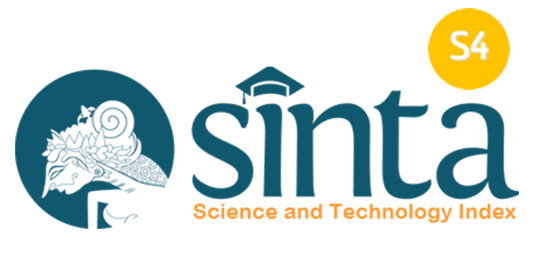THE EFFECTIVENESS OF PUZZLE PLAYING THERAPY IN REDUCING ANXIETY IN PRESCHOOL CHILDREN WITH ACUTE RESPIRATORY INFECTIONS: A PRE-EXPERIMENTAL STUDY
Downloads
Introduction: Acute Respiratory Infections (ARI) are a leading cause of morbidity and mortality in preschool children. Nebulizer therapy is effective for ARI, but it can cause anxiety in pediatric patients, which may hinder their cooperation and recovery. This study aims to evaluate the effectiveness of puzzle play therapy in reducing anxiety levels among preschool children with ARI undergoing nebulizer treatment. Methods: A pre-experimental study utilizing a one-group pretest-posttest design was conducted involving 23 preschool children diagnosed with ARI who received nebulizer therapy in the Children's Room A11 at SMC Telogorejo Hospital, Semarang, between March and April 2024. Anxiety levels were assessed pre- and post-intervention using the Taylor Manifest Anxiety Scale (TMAS), which has demonstrated validity (CVI score = 1.0, reliability = 0.89). Puzzle play therapy was administered alongside nebulizer therapy, and the data were analyzed through paired t-tests.Results: Most participants were 4-year-old males (47.8%) with a hospital stay of more than seven days (56.5%). Before the intervention, 73.9% of participants had severe anxiety (mean = 23.65). Following the intervention, 73.9% of participants reported moderate anxiety (mean score = 12.78), with no instances of severe anxiety. The statistical analysis showed a significant decrease in anxiety levels (p = 0.001). Conclusions: Puzzle play therapy effectively reduced anxiety in children during nebulizer treatment. This intervention can be implemented as a non-pharmacological approach to manage anxiety in pediatric patients during medical procedures. Further research should investigate its long-term benefits and applicability in various clinical settings.
Ari, A. (2021). A path to successful patient outcomes through aerosol drug delivery to children: a narrative review. Ann Transl Med, 9(7), 593. https://doi.org/10.21037/atm-20-1682
Arif Rohman, M., & Mutia, F. (2023). Growth And Development Of Preschool-Aged Children. Probolinggo: Eureka Media Aksara.
Bates, R. A., Militello, L., Barker, E., Villasanti, H. G., & Schmeer, K. (2022). Early childhood stress responses to psychosocial stressors: The state of the science. Dev Psychobiol, 64(7), e22320. https://doi.org/10.1002/dev.22320
Bouras, N. N., Mack, N. R., & Gao, W.-J. (2023). Prefrontal modulation of anxiety through a lens of noradrenergic signaling [Review]. Frontiers in Systems Neuroscience, 17. https://doi.org/10.3389/fnsys.2023.1173326
Cardinal, F. G., Arroyo, G. M., Magbanua, S., & Sajnani, A. K. (2017). Measurement of Anxiety in 3-9 Year Old Children Receiving Nursing Intervention. J Caring Sci, 6(4), 293-302. https://doi.org/10.15171/jcs.2017.028
Dave, N. M. (2019). Premedication and Induction of Anaesthesia in paediatric patients. Indian Journal of Anaesthesia, 63(9), 713-720. https://doi.org/10.4103/ija.IJA_491_19
Fathmawati, F., Rauf, S., & Indraswari, B. W. (2021). Factors related with the incidence of acute respiratory infections in toddlers in Sleman, Yogyakarta, Indonesia: Evidence from the Sleman Health and Demographic Surveillance System. PLoS One, 16(9), e0257881. https://doi.org/10.1371/journal.pone.0257881
Godino-Ianez, M. J., Martos-Cabrera, M. B., Suleiman-Martos, N., Gomez-Urquiza, J. L., Vargas-Roman, K., Membrive-Jimenez, M. J., & Albendin-Garcia, L. (2020). Play Therapy as an Intervention in Hospitalized Children: A Systematic Review. Healthcare (Basel), 8(3). 239. https://doi.org/10.3390/healthcare8030239
Haryadi. (2019). Pengaruh Terapi Bermain Puzzle Terhadap Tingkat Kecemasan Hospitalisasi pada Anak Usia Pra Sekolah (3-6 Tahun) di RSUD Dr. Harjono abupaten Ponorogo. https://doi.org/10.33846/2trik9414
Inderiati, D., Rachmawaty, T., & Amaniah Anhar, C. (2023). Identification of Acute Respiratory Infection Patients Using RP2 Nested Multiplex PCR Test in Jakarta, Indonesia. Medical Laboratory Technology Journal, 9(1), 53-62. https://doi.org/10.31964/mltj.v8i2.519
Islaeli, I., Yati, M., Islamiyah, & Fadmi, F. R. (2020). The effect of play puzzle therapy on anxiety of children on preschooler in Kota Kendari hospital. Enfermería Clínica, 30, 103-105. https://doi.org/https://doi.org/10.1016/j.enfcli.2019.11.032
Kemenkes. (2023). Indonesia Health Profile 2023. (https://www.kemkes.go.id/id/profil-kesehatan-indonesia-2023).
Kuzujanakis, M. (2021). Anxiety in today’s children and young adults. Gifted Education International, 37(1), 54-66. https://doi.org/10.1177/0261429420934445
Longest, W., Spence, B., & Hindle, M. (2019). Devices for Improved Delivery of Nebulized Pharmaceutical Aerosols to the Lungs. J Aerosol Med Pulm Drug Deliv, 32(5), 317-339. https://doi.org/10.1089/jamp.2018.1508
Nisa, N., Mariyam, & Yosafianti, P. V. (2023). The Effect of Building Block Therapeutic Play Program on Preschooler’s Anxiety Levels in Indonesia. In Proceedings of the 1st Lawang Sewu International Symposium 2022 on Health Sciences (LSISHS 2022) (pp. 306-314). https://doi.org/10.2991/978-94-6463-132-6_35
Nurwulansari, N., Ashar, M. U., Huriati, H., & Syarif, S. (2019). The Effect of Constructive Play Therapy on Anxiety Levels of Preschool Children Due to Hospitalization. Journal of Health Science and Prevention, 3(3S), 72-78. https://doi.org/10.29080/jhsp.v3i3S.282
WHO. (2024). World Health Statistics 2024: Monitoring Health for the SDGs, Sustainable Development Goals. https://doi.org/9789240094703
Wulandari, R. A., Fauzia, S., & Kurniasari, F. (2024). Investigations on the risk factors of Acute Respiratory Infections (ARIs) among under-five children in Depok City, Indonesia. Ann Ig, 36(1), 15-25. https://doi.org/10.7416/ai.2023.2580
Copyright (c) 2025 Umi Sofiatun, Nafisatun Nisa, Siti Lestari

This work is licensed under a Creative Commons Attribution 4.0 International License.
Copyright Notice
1. The journal allows the author to hold the copyright of the article without restrictions.
2. The journal allows the author(s) to retain publishing rights without restrictions.
3. The legal formal aspect of journal publication accessibility refers to Creative Commons Attribution (CC BY).














